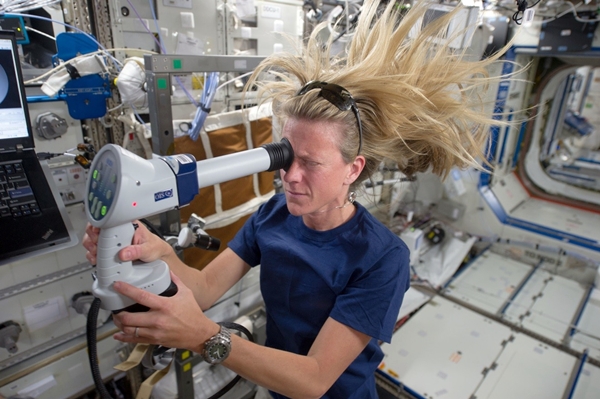21 June 2017. A range of biological functions will be assessed with model organs on plastic chips in a series of experiments on the International Space Station. The 2-year research projects totaling $6 million are funded by National Center for Advancing Translational Sciences, part of the National Institutes of Health, and directed by Center for the Advancement of Science in Space, the national lab managing the International Space Station.
The five studies in the initiative are using organ-on-chip devices that simulate human functions. The devices are often made of clear polymer plastic with fine channels etched in the surface or drilled through, lined with live cells, and designed with supporting instruments and software to perform and measure functions similar to humans or animals. The chip makers say on earth these devices can provide more precise and reliable testing of drugs, food, and cosmetics than many preclinical tests now performed with lab animals.
In this program, researchers aim to take advantage of weightlessness, or microgravity, on the International Space Station to study its effects on various human organs. A team from Children’s Hospital of Philadelphia and the companies Space Technology Advanced Research Systems Inc. in Houston and SpacePharma Inc. in Courgenay, Switzerland are using models of the human airway and bone marrow to learn more about mechanisms affecting infections during weightlessness and overall immune system health. In this case, the researchers are focusing on the functions of the respiratory system under these conditions.
Another project investigates the blood-brain barrier in microgravity. The blood-brain barrier is a filtering mechanism in the brain and spinal cord to prevent toxins in the blood from affecting the central nervous system, but it also prevents many drugs from working with the potential to treat neurological diseases. A team from Emulate Inc. in Boston and Space Tango in Lexington, Kentucky is assessing effects of microgravity, but also the extra G-forces experienced in liftoff, as well as hypoxia or lack of oxygen and increased stress of space flight on brain function.
This study will use Emulate Inc.’s brain chip, made with neuron and blood vessel cells, to assess treatments for inflammation in the brain under space flight conditions, focusing on the blood-brain barrier. As reported by Science & Enterprise in April, Emulate Inc. is in a joint venture with Food and Drug Administration to evaluate organ chips as a way to test new drugs for toxic effects.
A separate study in the initiative is testing the effects of space flight on musculoskeletal functions after osteoarthritis and bone loss following trauma. Researchers from MIT and the company Techshot in Greenville, Indiana are using a tissue chip model of bone and cartilage to study the effects of different drugs to reduce bone loss and cartilage degeneration on earth as well as the International Space Station.
Another part of initiative is studying effects of microgravity on the aging process, specifically loss of neurological and cardiovascular abilities, defects in bone healing, and changes in immune functions. A team from University of California in San Francisco and Space Technology Advanced Research Systems is assessing the relationship between the aging process and weightlessness on the return to earth as well as under microgravity.
The initiative includes a project to evaluate kidney health in microgravity, already suspected of accelerating the risk of kidney disorders such as protein in urine and kidney stones. Researchers from University of Washington in Seattle and the company BioServe Space Technologies in Beltsville, Maryland will deploy a kidney chip model on the International Space Station to help design treatments for these kidney conditions.
The current funding will support these studies for 2 years, but can be extended for another 2 years.
More from Science & Enterprise:
- Cancer Center to Test Focused Radiation Therapy
- Stem Cells Launched on Current SpaceX Flight
- Spacecraft Returns with Space Station Research Samples
- Report from Maker Faire: Plastic Recycling Made in Space
- Collaboration Explores Humanitarian Satellite Applications
* * *


 RSS - Posts
RSS - Posts
[…] Organ Chips to be Studied on Space Station […]